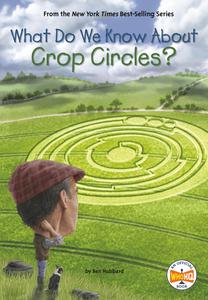
What Do We Know About Crop Circles? (What Do We Know About?) by Ben Hubbard, Who HQ
English | August 16th, 2022 | ISBN: 0593386752 | 112 pages | True EPUB | 66.38 MB
The What Do We Know About? series explores the mysterious, the unknown, and the unexplained. Are the geometric field patterns fact, myth, or legend?

Basil Davidson, "West Africa before the Colonial Era: A History to 1850"
English | ISBN: 1138174475 | 2016 | 272 pages | EPUB | 5 MB
This is a survey of pre-colonial West Africa, written by the internationally respected author and journalist, Basil Davidson. He takes as his starting point his successful textA History of West Africa 1000-1800, but he has reworked his new text specially for a wider international readership. In the process he offers a fascinating introduction to the rich societies and cultures of Africa before the coming of the Europeans.

We've Got to Try: How the Fight for Voting Rights Makes Everything Else Possible by Beto O'Rourke
English | August 23, 2022 | ISBN: 1250852455 | True EPUB | 224 pages | 0.7 MB
Activist and political leader Beto O'Rourke blends history, sociology, and travelogue for a thrilling, inspiring case for how voting rights is essential to a productive and healthy democracy.

James Carville "We're Still Right, They're Still Wrong: The Democrats' Case for 2016"
English | 2016 | ISBN: 0399576223 | EPUB | pages: 72 | 1.6 mb
Every politico and pundit has tried to explain the 2016 presidential race, but James Carville - the multiple best-selling Ragin' Cajun and grand strategist of Bill Clinton's rise to the White House - has largely stayed silent. Until now.

We'll Be Back: The Fall and Rise of America by Kurt Schlichter
English | July 12th, 2022 | ISBN: 1684513308 | 256 pages | True EPUB | 2.39 MB
Humor and polemics from one of America's most quotable pundits. A call for renewal and a howl of laughter and derision at the woke mob that seeks to stand in the way of a great nation's patriotic resurgence. Fans of Mark Levin, Matt Walsh, and Ben Shapiro will love it!

Bill Winger, "Water Bath Canning & Preserving Cookbook for Preppers: 1200 Days of Delicious Preserved Recipes to Stock Up Meat, Fish, Veggies, Fruits & More for the Next 4 Years"
English | 2022 | ASIN: B0B7QJWV5H, B0B88PHJR7 | EPUB | pages: 95 | 0.4 mb
ZERO WASTE - MAXIMIZE SAFETY

Warfare in Tenth-Century Germany By David S. Bachrach
2012 | 324 Pages | ISBN: 1843837625 | PDF | 4 MB
Over the course of half a century, the first two kings of the Saxon dynasty, Henry I (919-936) and Otto I (936-973), waged war across the length and breadth of Europe. Ottonian armies campaigned from the banks of the Oder in the east to the Seine in the west, and from the shores of the Baltic Sea in the north, to the Adriatic and Mediterranean in the south. In the course of scores of military operations, accompanied by diligent diplomatic efforts, Henry and Otto recreated the empire of Charlemagne, and established themselves as the hegemonic rulers in Western Europe.This book shows how Henry I and Otto I achieved this remarkable feat, and provides a comprehensive analysis of the organization, training, morale, tactics, and strategy of Ottonian armies over a long half century. Drawing on a vast array of sources, including exceptionally important information developed through archaeological excavations, it demonstrates that the Ottonian kings commanded very large armies in military operations that focused primarily on the capture of fortifications, including many fortress cities of Roman origin. This long-term military success shows that Henry I and Otto I, building upon the inheritance of their Carolingian predecessors, and ultimately that of the late Roman empire, possessed an extensive and well-organized administration, and indeed, bureaucracy, which mobilized the resources that were necessary for the successful conduct of war.

WORK FROM HOME: How to start and launch your online business by Jonathan Pius
English | 2022 | ISBN: N/A | ASIN: B0B8PHSYVD | 50 pages | EPUB | 0.12 Mb
As the world is fast evolving, you need to flow with it or you get left out.

Vertigo: A Clinical Guide by Shabih H. Zaidi, Arun Sinha
English | PDF | 2013 | 202 Pages | ISBN : 3642364845 | 1.8 MB
Vertigo is an enigma. It is a malady for all ages. It is also a greatly misunderstood and underrated clinical condition. Most physicians see vertiginous patients in their daily practice but no consensus has yet been reached on the true extent of this highly debilitating condition. Vertigo has diverse causes and forms. Diagnosis usually relies heavily on a detailed history and thorough clinical examination, but imaging techniques and a range of vestibular tests are also helpful. Most patients can be treated conservatively with anti-vertiginous drugs and/or rehabilitation therapy, but some require surgical intervention.

Utamakura, Allusion, and Intertextuality in Traditional Japanese Poetry By Edward Kamens
1997 | 336 Pages | ISBN: 0300068085 | PDF | 24 MB
A central feature of traditional Japanese poetry (waka) is the use of utamakura―a category of poetic words, many of which are place-names or the names of features associated with them―to cultivate allusion and intertextuality between individual poems and within the tradition. In this book Edward Kamens analyzes a wide selection of poems to show how utamakura came to wield special powers within Japanese poetry. He reveals how poets in generation after generation returned, either in person or in imagination, to these places and to poems about them to encounter again the forms, styles, and techniques of their forebears, and to discover ways to create new poems of their own. Kamens focuses especially on one figure, "the buried tree," which refers to fossilized wood associated in particular with an utamakura site, the Natori River, and is mentioned in poems that first appear in anthologies in the early tenth century. The figure surfaces again at many points in the history of traditional Japanese poetry, as do the buried trees themselves in the shallow waters that otherwise conceal them. After explaining and discussing the literary history of the concept of utamakura, Kamens traces the allusive and intertextual development of the figure of the buried tree and the use of the place-name Natorigawa in waka poetry through the late nineteenth century. He investigates the relation between utamakura and the collecting of fetishes and curios associated with utamakura sites by waka connoisseurs. And he analyzes in detail the use of utamakura and their pictorial representations in a political and religious program in an architectural setting―the Saishoshitennoin program of 1207.


